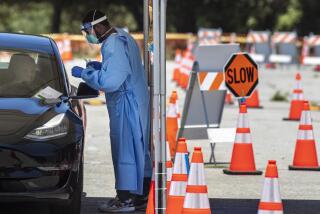New A-Test Proposal Sent to Gorbachev
- Share via
WASHINGTON — President Reagan announced Friday that he has sent Soviet leader Mikhail S. Gorbachev “a new, very specific and far-reaching proposal” to monitor nuclear testing that could be implemented immediately and lead to ratification of two treaties.
Reagan said in a written statement that if the Soviets are willing to accept the new verification system, he is prepared to move forward on ratification of the Threshold Test Ban and the Peaceful Nuclear Explosions Treaty.
He said that he identified to Gorbachev “a specific new technical method--known as CORRTEX--which we believe will enable the United States and the Soviet Union to improve verification and ensure compliance with these two treaties.”
The President invited Gorbachev to send his scientists to a Nevada test site during the third week of April to see and discuss the new verification method and to monitor a “planned U.S. nuclear weapons test.”
Stumbling Block
Reagan has consistently refused to go along with the Soviets’ self-imposed nuclear test moratorium. Verification has been the chief stumbling block to his refusal to go along with the two test ban treaties.
“My new initiative is a further attempt to build the necessary basis for confidence and cooperation between our nations regarding such limitations,” Reagan said.
He described the new system as “a hydrodynamic yield measurement technique that measures the propagation of the underground shock wave from a nuclear explosion.”
Reagan said he provided detailed information to Moscow “in trying to solve verification uncertainties.”
Compliance Urged
“It is important that the Soviet Union engage with us now in this first practical step to improve the confidence we each must have in treaty compliance with the 150-kiloton threshold underground tests,” he said.
The Soviets are under a self-imposed nuclear testing moratorium.
Reagan said that arms control “has been the subject of special correspondence which I have had recently with Soviet General Secretary Gorbachev,” the six leaders of nations known as the Delhi Group and Senate GOP leader Robert Dole.
The House passed a resolution Feb. 26 urging the President to resume negotiations with the Soviet Union on a comprehensive nuclear test ban.
Violation Charged
Last week, the U.S. Arms Control and Disarmament Agency said that the Soviets “likely violated” both test bans, by testing larger than permitted weapons underground and by permitting these explosions to “vent” into the atmosphere, releasing radiation.
“In this new initiative,” Reagan said, “I urged the Soviet Union to join us without delay in bilateral discussions on finding ways to reach agreement on essential verification improvements of the Threshold Test Ban and Peaceful Nuclear Explosions Treaty.”
The Threshold Test Ban Treaty was signed in 1974, but was never ratified by the Senate. It prohibits underground nuclear tests having a yield exceeding 150 kilotons--equivalent to 150,000 tons of TNT.
The Senate has never ratified the treaty because it had hoped that the Peaceful Nuclear Explosions would also be signed and that the two could be ratified together. The peaceful explosions treaty would permit the use of nuclear explosions, under very specific circumstances, for mammoth projects, such as construction of a new Panama Canal.
‘Central Element’
He said that effective verification of nuclear testing has been the “central element” in arms control. “It has also long been one of the most difficult problems to resolve,” he added.
Reagan said the United States is “seriously concerned about the past pattern of Soviet testing as well as current verification uncertainties” and has determined that a number of Soviet tests “constitute likely violations of obligations under the Threshold Test Ban Treaty of 1974.”
“The inadequacy of the monitoring regime provided for in that agreement is underscored by the Soviet Union’s own questions concerning the yields of particular U.S. tests, all of which in fact have been below the 150-kiloton threshold,” the President said.
Reagan said the U.S. “places the highest priority in the nuclear testing area on finding ways of ensuring effective verification” of the two pending treaties.
“I have already made several specific suggestions to the Soviet Union in that regard,” he said.
“In making this offer,” he said, “I made clear to General Secretary Gorbachev that if we could reach agreement on the use of an effective verification system incorporating such a method to verify” the test ban treaty, “I would be prepared to move forward on ratification of both” treaties.
In Moscow Friday, the Soviet Union urged the United States to begin new bilateral talks in Washington, Moscow or Geneva on a total ban of nuclear weapons tests.
Deputy Foreign Minister Viktor Komplektov told a news conference the talks could begin as soon as April if Reagan accepted the invitation.
The proposal was put forward Thursday by Gorbachev in a reply to the leaders of six non-aligned nations that had urged the Soviet Union to extend its unilateral test ban at least until the next superpower summit.
More to Read
Sign up for Essential California
The most important California stories and recommendations in your inbox every morning.
You may occasionally receive promotional content from the Los Angeles Times.












